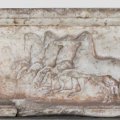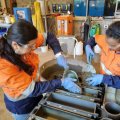Our liver could be a major springboard for determining life-changing diabetes diagnosis and treatment thanks to a world-first discovery by an Australian-Chinese research team.
Scientists at The University of Queensland have been working with a team from Wuhan University in China and have identified a link between the structure of the glucose-storage molecule (known as glycogen) in our liver cells and diabetes.
Glycogen in liver comprises two sorts of molecules: smaller ones known as beta particles, and dozens of these joined together, known as alpha particles. Through extensive laboratory studies, the research partnership has shown diabetic mice have lower levels of alpha particles compared to healthy mice. Having fewer alpha particles will impair the body’s means of gently regulating blood sugar levels against glucose spikes.
The lead scientist in this discovery, Professor Robert Gilbert, working within the Queensland Alliance for Agriculture and Food Innovation (QAAFI), said the latest research findings were the result of some of the world’s best researchers in the field of molecular science utilizing new technology and a unique partnership to identify how to manage what is fast becoming an international epidemic.
“This discovery sheds new light on diabetes: it suggests that there is a molecular mechanisms involved in the lack of control of blood sugar which characterizes diabetes,” Professor Gilbert said.
“Type-2 diabetes is growing at epidemic rates: it is estimated that by 2025, three million Australians will suffer from this disease.”
“This new insight opens the way to potential new means of diagnosis and clinical intervention,” he said.
The research partnership will extend their findings to larger-scale tests with a view to establishing sought-after DNA testing and targeted liver treatment drugs.
In addition to the UQ/Wuhan findings, research in this area has involved the input of scientists from Monash University, the University of Melbourne and Southern Cross University.
Media: Julie Lloyd, QAAFI Communication Manager (0415 799 890, julie.lloyd@uq.edu.au)
QAAFI background
Launched on October 21, 2010, the Queensland Alliance for Agriculture and Food Innovation is an Institute of the University of Queensland and was formed through and alliance between the University and the Queensland Government’s Department of Employment, Economic Development and Innovation (DEEDI). QAAFI draws together 100 research teams specialising in plant, animal and food sciences from twelve UQ and DEEDI sites across Queensland.
The QAAFI vision is to be a world leader in tropical and subtropical agricultural and food research and development. QAAFI will ensure that cutting-edge science and science education is applied to support sustainable tropical and subtropical agriculture and food production.
.jpg)



